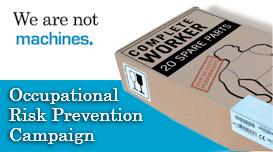Psychosocial Risks

1. Introduction
Psychosocial risks have their roots in the complex environment of work organisation and, despite the fact that their negative consequences for health are not as evident as accidents at work or occupational illnesses, they may also have a notable influence, taking the form of problems such as absenteeism, staff turnover, quality defects or stress which, taken together, represent substantial costs both in terms of people’s health and economic losses for the firm.
Psychosocial factors may be defined as “those characteristics of work conditions and, above all, of its organisation that affect the health of people through psychological and physiological mechanisms which we also call stress” (Istas21 definition).
More or less all of us have an intuitive concept of what stress is, a response of the organism to a situation that requires some kind of response; said response translates as placing the organism itself in a situation of alert so as to be able to act. This process is normal and has allowed humans to survive to our days; when faced with a threatening situation, our entire body gets prepared for flight or fight. Once the threat disappears, the organism returns to its normal state.
Stress constitutes a hazard when the situation of alert is prolonged in time; this impedes the organism from relaxing, which means that it remains in a continuous state of tension. If this situation is maintained over time, it may give rise to all kinds of disorders in the organism.
Stress could thus be defined as “the set of emotional, cognitive, physiological and behavioural reactions to certain adverse or harmful aspects of the content of work, its organisation or environment; it is a state that is characterised by high levels of excitation and anxiety, with the frequent sensation of not being able to cope with the situation” (Istas21 definition).
Understanding health as a “state of physical, psychological and social equilibrium” (WHO definition), the need to consider the psychosocial aspects of work becomes evident, not only as risk factors, which we must act on to avoid negative consequences for health, but as a way of fostering positives questions for the health of workers such as their well being and job satisfaction.




